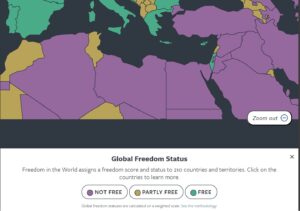For decades, political scientists studying the Middle East have tried to solve the region’s unique resistance to democracy or rather, the persistence of authoritarianism. In her 2006 article “Searching Where the Light Shines: Studying Democratization in the Middle East,” Anderson argues that one of the main reasons why political scientists have failed to understand the political forces at work in the Middle East is due to the West, in particular the United States, projecting democracy as the measure of politics onto the rest of the world based on their institutions, values, and ideals (Anderson 191). Especially after events such as Secretary Albright’s speech in 2001 and 9/11, political scientists have become preoccupied with democracy and American foreign policy’s emphasis of democratization; two unnatural and ambiguous notions to both Arab leaders and people. By trying to fit the region into the western boundaries of political science, an awkward and ill-fitting framework for understanding dynamics in the Middle East,” political scientists have become unable to study of Middle Eastern politics and the region’s contribution to comparative politics (Anderson 205).

Freedom House Map depicting the numerous MENA countries who are ranked as “not free.”
Anderson refers to the metaphor of finding a key on a street to illustrate her argument. Instead of searching for the key only in the light meaning fixating on the Western idea of “democratization,” political scientists should search more in the shadows, “in the arenas of political life less well illuminated by conventional political science” (Anderson 210).
Anderson highlights the many faults in the universal democracy bandwagon enforced by the West. First, American political science is ahistorical where political scientists only recognized Middle Eastern societies after their independence, ignoring their rich regional histories. Many of the political scientists, also focused on the role religion in sustaining democracy; while most political scientists agreed that Islamist politics often coincided with the emergence of democracy, others found it difficult to differentiate the Muslim world from the Arab Middle East.
As a class, we can avoid or compensate for these potential problems by recognizing that democracy is not the only aspect of political science we should be looking at when trying to understand a country’s political dynamics. We can also work to avoid any biases, especially from a Western perspective, and instead, analyzing the region by equally taking into account its’ rich history, culture, religions, and uniquity.
Anderson’s article also discusses how Arab people may not actually want or care about democracy due to the lack of “organized popular enthusiasm for democratic reform,” potential of people in the region not understanding the concept of democracy, and the term being used by insincere leaders to promote their interests and reputation (Anderson 204). However, the Arab uprisings of 2010-2011 would have proven that indeed, Arab people did want democracy. Perhaps they didn’t specifically use the words “democracy” or “democratization,” but they demanded basic human rights, dignity, and freedom. This social movement would have demonstrated to the political science community that many countries are filled with people willing to sacrifice for the democratic ideals of rights, dignity, and freedom.
References: Anderson, Lisa. “Searching where the light shines: Studying democratization in the Middle East.” Annual Review of Political Science, vol. 9, no. 1, 2006, pp. 189–214, https://doi.org/10.1146/annurev.polisci.9.072004.095345.

Leave a Reply